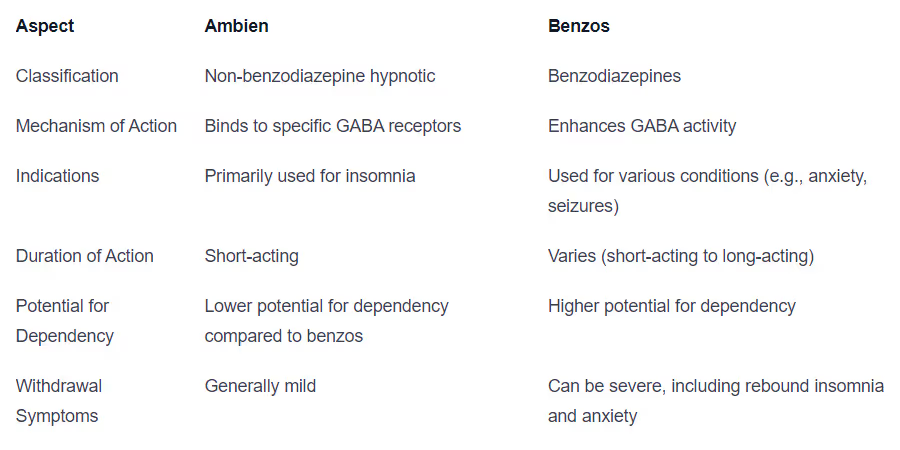Is Ambien a Benzo?

Understanding Ambien
Ambien is a medication that is commonly used to treat insomnia, a sleep disorder characterized by difficulty falling asleep or staying asleep. Let's take a closer look at what Ambien is and its common uses.
What is Ambien?
Ambien, also known by its generic name zolpidem, belongs to a class of medications called sedative-hypnotics. It acts on the brain to produce a calming effect, helping individuals with insomnia to fall asleep faster and stay asleep longer.
Ambien is available in different formulations, including immediate-release tablets, extended-release tablets, and sublingual tablets. The immediate-release tablets are typically taken right before bedtime, while the extended-release tablets are designed to release the medication gradually throughout the night.
Common Uses of Ambien
Ambien is primarily prescribed for the short-term treatment of insomnia. It is commonly used when other non-pharmacological approaches, such as improving sleep hygiene or behavioral therapies, have been ineffective. Ambien can provide relief for individuals who find it difficult to initiate sleep or experience frequent awakenings during the night.
It is important to note that Ambien is intended for short-term use only, usually for a duration of 7 to 10 days. Prolonged use may lead to dependence or tolerance, and it is advisable to consult a healthcare professional for long-term management of insomnia.
Here is a table summarizing the common uses of Ambien:
Common Uses of Ambien
Short-term treatment of insomnia
Facilitating faster sleep onset
Promoting longer sleep duration
Alleviating sleep disturbances
Understanding what Ambien is and its common uses can help individuals make informed decisions about their sleep health. It is essential to follow the prescribed dosage and duration of use as advised by a healthcare professional to ensure safe and effective treatment.
Classification of Medications
To understand the classification of Ambien, it's important to first have an overview of benzodiazepines (benzos) and their role in the medical field.
Benzos: An Overview
Benzodiazepines, commonly referred to as benzos, are a class of psychoactive drugs that are primarily prescribed for their sedative and anxiolytic properties. These medications work by enhancing the effects of a neurotransmitter called gamma-aminobutyric acid (GABA) in the brain. By increasing GABA activity, benzos help to reduce anxiety, induce sleep, and promote muscle relaxation.
Benzodiazepines are often prescribed for the treatment of anxiety disorders, panic disorders, insomnia, seizures, and muscle spasms. Some well-known benzos include diazepam (Valium), alprazolam (Xanax), and lorazepam (Ativan).
Is Ambien Classified as a Benzo?
Contrary to popular belief, Ambien (generic name zolpidem) is not classified as a benzodiazepine. Ambien belongs to a different class of drugs known as non-benzodiazepine hypnotics or, more specifically, imidazopyridines. While Ambien shares some similarities with benzos in terms of its sedative effects, it has a distinct chemical structure and mechanism of action.
The classification of Ambien as a non-benzodiazepine hypnotic is based on its specific binding affinity to the GABA receptors in the brain. Ambien acts on a subtype of GABA receptors known as GABA-A receptors, but it interacts with these receptors in a different manner compared to benzodiazepines.
It's important to note that even though Ambien is not a benzo, it still carries the potential for abuse, dependence, and adverse effects. Like benzos, Ambien is a controlled substance and should be used under the guidance of a healthcare professional.
Understanding the classification of medications, such as benzos and non-benzodiazepine hypnotics like Ambien, can help individuals make informed decisions about their treatment options. If you have any concerns or questions about the classification or appropriate use of Ambien, it's always advisable to consult with a healthcare professional who can provide personalized guidance based on your specific needs and medical history.
Differentiating Ambien from Benzos
When discussing the classification of medications, it's important to differentiate between Ambien and benzodiazepines (benzos). While they share some similarities, there are key differences that set them apart.
Similarities Between Ambien and Benzos
Ambien and benzodiazepines do have some similarities in their effects on the central nervous system (CNS). Both Ambien and benzos are classified as sedative-hypnotics, meaning they have sleep-inducing properties. They are commonly prescribed to treat sleep disorders, such as insomnia.
Additionally, both Ambien and benzos enhance the effects of gamma-aminobutyric acid (GABA), a neurotransmitter that helps regulate brain activity. By increasing GABA activity, both Ambien and benzos promote relaxation and reduce anxiety.
Key Differences Between Ambien and Benzos
While Ambien and benzos share similarities, there are key differences that distinguish them from each other.

One of the main differences is the classification of the medications. Ambien is classified as a non-benzodiazepine hypnotic, while benzodiazepines, as the name suggests, are a specific class of medications.
Another distinction lies in their mechanism of action. Ambien binds to specific GABA receptors, while benzos enhance the overall activity of GABA in the brain.
In terms of indications, Ambien is primarily prescribed for the treatment of insomnia, whereas benzodiazepines have a broader range of uses, including anxiety disorders and seizures.
The duration of action is also different between Ambien and benzos. Ambien is generally short-acting, whereas the duration of action for benzodiazepines varies from short-acting to long-acting formulations.
Furthermore, the potential for dependency differs between Ambien and benzos. Ambien generally has a lower potential for dependency compared to benzodiazepines, which can be associated with a higher risk of dependence and withdrawal symptoms.
It's worth noting that the differences between Ambien and benzos underscore the importance of consulting with a healthcare professional before starting any medication. They can provide personalized guidance based on your specific needs and medical history.
How Ambien Works
To understand how Ambien functions, it's important to delve into its mechanism of action and the effects it has on the body.
Mechanism of Action
Ambien, also known by its generic name zolpidem, belongs to a class of medications called sedative-hypnotics. It works by targeting specific receptors in the brain known as gamma-aminobutyric acid (GABA) receptors. GABA is a neurotransmitter that helps regulate brain activity and has a calming effect on the central nervous system.
Ambien enhances the activity of GABA in the brain, which leads to a decrease in neuronal activity and produces a sedative effect. By binding to GABA receptors, Ambien helps promote sleep by inducing drowsiness and reducing the time it takes to fall asleep.
It's important to note that Ambien has a relatively short half-life, which means it is rapidly eliminated from the body. This allows individuals taking Ambien to achieve restful sleep without experiencing excessive drowsiness the following day.
Effects on the Body
The primary effect of Ambien is its ability to promote sleep and treat insomnia. By targeting GABA receptors in the brain, Ambien helps calm the central nervous system, enabling individuals to fall asleep more quickly and enjoy a full night's rest.
In addition to its sleep-inducing properties, Ambien may also cause other effects on the body. These can include relaxation of muscles, reduction of anxiety, and an overall sense of calmness. However, it's important to note that the effects can vary from person to person, and some individuals may experience side effects or have a different response to the medication.
It's crucial to use Ambien as directed by a healthcare professional and to be aware of potential side effects and precautions associated with its use. Consulting with a healthcare professional prior to starting Ambien is recommended to determine the appropriate dosage and to discuss any potential risks or interactions with other medications.
Understanding how Ambien works, its mechanism of action, and its effects on the body can help individuals make informed decisions about its use and ensure safe and effective treatment of insomnia.
Safety and Considerations
When using Ambien, it's important to be aware of the potential side effects, take necessary precautions, and consider consulting with a healthcare professional. Here are some key factors to keep in mind:
Potential Side Effects of Ambien
Like any medication, Ambien can have side effects. While not everyone experiences these side effects, it's essential to be familiar with them. The table below outlines some potential side effects associated with Ambien:
Side Effects
Drowsiness
Dizziness
Headache
Nausea
Diarrhea
Dry mouth
Muscle pain
Memory problems
Unusual dreams
Sleepwalking or engaging in activities while not fully awake
It's important to note that this is not an exhaustive list. If you experience any unusual or severe side effects while taking Ambien, it is advisable to seek medical attention.
Precautions and Warnings
Before using Ambien, it is crucial to take certain precautions and be aware of any warnings associated with its use. Here are some considerations:
- Ambien should only be taken as prescribed by a healthcare professional. It is important to follow the recommended dosage and duration of use.
- Inform your healthcare provider about any other medications, supplements, or herbal products you are taking, as they may interact with Ambien.
- Avoid consuming alcohol while taking Ambien, as it can increase the risk of side effects and impair your judgment and coordination.
- Use caution when engaging in activities that require alertness, such as driving or operating machinery, as Ambien may impair your ability to perform these tasks.
- If you have a history of substance abuse, mental health conditions, or liver or kidney problems, consult with your healthcare provider before taking Ambien.
- Ambien is not recommended for use in pregnant or breastfeeding individuals, as its effects on the fetus or infant are not well-established. Consult with a healthcare professional for guidance in these situations.
Consultation with a Healthcare Professional
Whenever considering the use of Ambien or any other medication, it is advisable to consult with a healthcare professional. They can provide personalized guidance based on your medical history, current medications, and individual circumstances. A healthcare professional can help determine if Ambien is the right choice for you, discuss potential risks and benefits, and address any concerns or questions you may have.
Remember, this article is for informational purposes only and should not replace professional medical advice. Always consult with a healthcare professional for personalized guidance regarding your specific situation.
Conclusion
In conclusion, understanding the differences between Ambien and benzodiazepines can help individuals make informed decisions about their treatment options for sleep disorders like insomnia. While both medications promote relaxation and reduce anxiety, they have distinct mechanisms of action and potential side effects.
If you're considering using Ambien or any other medication to treat insomnia, it's important to consult with a healthcare professional first. They can provide personalized guidance based on your specific needs and medical history, as well as recommend appropriate dosages and durations of use.
Remember that medication is just one piece of the puzzle when it comes to treating insomnia. Practicing good sleep hygiene habits, such as maintaining a consistent sleep schedule, avoiding caffeine and electronics before bedtime, and creating a relaxing sleep environment can also be helpful in promoting restful sleep.
By working with a healthcare professional and implementing healthy lifestyle habits, individuals can improve their chances of achieving restful sleep and improving their overall quality of life.
